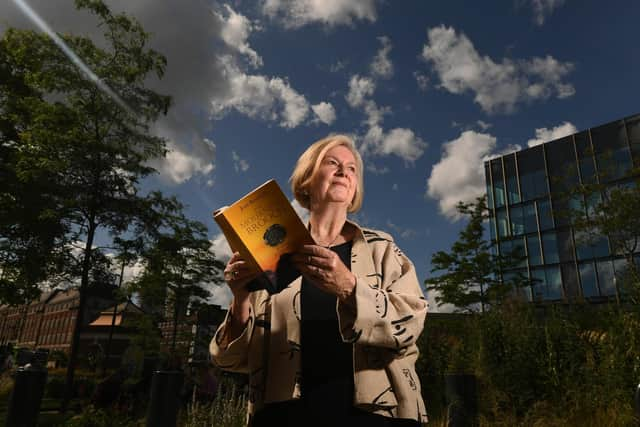Amateur historian writes 'faction' novel after researching family saga of two Yorkshire sisters from 1849 until 1943
Jean Renwick, 77, was inspired to write The Mourning Brooch trilogy after inheriting a sentimental item of jewellery from her godmother, through whose family it had passed, in 1989.
The mourning brooch dated back to 1849, when a young farmer’s wife died in the village of Bentley, near Doncaster, leaving two girls, Mary-Ann and Frances, just five years old and a baby at the time. Her husband, Joseph Addy, commissioned a gold brooch with strands of their hair woven together – though he later remarried, with the bride his wife’s sister.
Advertisement
Hide AdAdvertisement
Hide AdThe Addy girls had very different fates; the elder marrying into a wealthy family of Bradford wool merchants and eventually moving to America, and the younger remaining in Doncaster and marrying a farmer whose fortunes suffered in an agricultural depression.


The first book told the stories of the sisters’ coming of age, but the second, covering the period from 1876 to 1913 and published next month, creates scenarios out of real characters once they had started families of their own.
Jean, who lives in Warwickshire, combined fact and fiction by fleshing out the personalities of those whose lives she researched. One main source was old newspaper reports, especially those covering a scandalous court case concerning the divorce of one of the six sons of the Willey family, the Bradford industrial dynasty that Mary-Ann Addy became part of. Another treasure trove was the papers of her husband left in Bradford’s city archives by his solicitors when the firm closed down. Birth, marriage and death certificates and census data were also pored over.
Jean initially followed a false trail, believing that the brooch would have descended through the elder daughter’s family – in fact it stayed in the possession of Frances, who had a son who died young and six daughters.
Advertisement
Hide AdAdvertisement
Hide AdA set of silver cutlery also given to her by her godmother was inscribed as a wedding gift from the Earl of Derby to his underbutler, a descendant of the younger Addy sister who worked at Knowsley Hall, near Liverpool. She was then able to ‘work backwards’ to trace other family members.
"Their lives went in two very different directions, and it’s an intriguing story. I only had the basic skeleton of who these people were, and the newspaper reports were so valuable in giving me an idea of their personalities. A son of the Willey family was divorced by his wife for beating her, and the Yorkshire press all covered this hearing in London – the family must have been horrified.”
Mary-Ann, who later changed her name to the more refined Marian, lived in a villa on Hanover Square in the then-prosperous Bradford suburb of Manningham with John-Henry, her husband, for 15 years. In the 1870s, they moved to Philadelphia, the USA’s textile capital, and did well there until John-Henry’s death in 1920. His brother Francis had remained in Yorkshire, and the original family business continued to trade until the 1950s, with Francis and his son eventually becoming landed gentry.
Frances stayed in the villages of Bentley and Arksey, and their father’s farmhouse was not demolished until the 1950s. As industrialisation continued, farmers struggled to make a living and prices fell. She married Joe Mellows, who farmed at High Melton and then Cadeby, and her father also moved to a new farm in this area of Doncaster
Advertisement
Hide AdAdvertisement
Hide AdSome of their daughters ended up in domestic service, and Frances lived in a terraced house – a far cry from her sister’s situation. However, her son was given work in Philadelphia by his uncle John-Henry Willey.
"It all really cried out for a novel. I spent a fascinating morning with John-Henry’s box from his solicitors. I intend to finish my research in 1943, when my godmother inherited the brooch. It seems like a neat ending, and anything closer and within memory seems more intrusive.
"The first book was self-published, and had a very good reception. People loved it. I will have to delve deeply for the third book, and research through the world wars.
“Originally, I thought that all the direct descendants of Elizabeth Addy had died out but last year I discovered that there is one strand of the family remaining. Sarah Halswell is great-great-great-granddaughter of the woman commemorated by the mourning brooch, and has provided me with useful stories and photographs to help build the final story for the third book.”
The first two books in The Mourning Brooch trilogy are available to download on Amazon.
